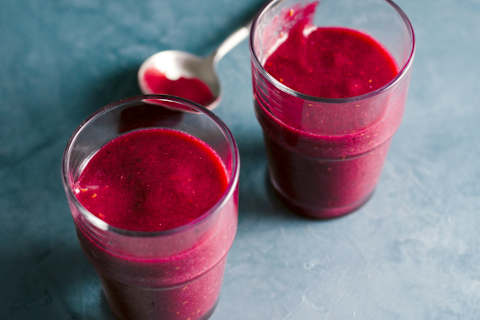Advertisement

If there's one supplement that trainers, nutritionists, and everyone else in the fitness world seems to be talking about, it's collagen. The stuff is being added to smoothies, soups, and stews, all in the name of muscle recovery and better-looking skin.
While it may seem like collagen came out of nowhere, it's actually been around for years. Same goes for collagen powder, but since marketing companies are great at sniffing out trends, they were able to predict when the stuff would fly off store shelves. The first inkling: bone broth.
Back in 2015, the murky-brown drink was super popular, thanks to the success of the paleo diet. That meal plan included bone broth, a protein that promised a myriad of health benefits because, hello, it's rich in collagen. "People discovered that adding bone broth not only boosted their digestion and immune systems, but [they also] experienced reduction of joint pain and inflammation and [saw] better skin," says Ariane Hundt, M.S., a clinical nutrition coach in New York City. "Supplement companies got wind of it and started feeding that trend, because who wants to drink bone broth in the hot summer when you can make a smoothie?"
Thus, the collagen frenzy was born.
But what exactly is collagen?
"Collagen is the most common type of protein in our bodies," Hundt says. About 80 percent of our skin is made of the stuff, and our bodies produce it from the amino acids (AKA protein building blocks) proline, glycine, arginine, and hydroxyproline. In other words, it's what holds our bodies together.
The problem is that we produce less collagen as we age, and over time you'll notice the difference. "Your skin starts to sag and feel less elastic, you'll have more frequent joint pains, and you can lose muscle mass," says Brigitte Zeitlin, MPH, R.D., owner of BZ Nutrition in New York City. Which is why many experts recommend consuming it through supplements.
Why is collagen good for you?
First of all, something that makes up 80 percent of our skin is clearly important if we want to preserve a healthy skin tone, prevent wrinkles and age spots, and generally feel like we're looking our best. But that's not all collagen is good for. It's also crucial for our bones, cartilage, tendons, joints, hair, nails, and connective tissue, Hundt says. "Sufficient production [of collagen also] allows for better skin, bone health, and tissue health," she explains. When that happens, you prevent not-so-fun health issues, like premature arthritis, joint pain, and inflammation, Zeitlin adds.
Science backs them both up: One study published in Skin Pharmacology and Physiology1 found that skin elasticity improved when people ages 35 to 55 took a collagen supplement for eight weeks, while another in Clinical Interventions in Aging2 revealed that taking one for three months increased collagen density where crow's feet develop. Research published in Current Medical Research and Opinion3 also found that when college athletes took collagen supplements, their joint pain lessened. And a study published in the British Journal of Nutrition4 found that those who consumed collagen peptides within an hour after exercise (just as you would with any protein powder) experienced improved muscle mass and strength.

So I should start taking collagen powder, right?
To be honest, it depends on your goals, and you should always talk with your doctor before starting a new supplement. Protein powders derived from different sources are better for achieving different milestones. Take whey, for example. "Whey protein powder is made from dairy and doesn't provide collagen benefits," Hundt says. While it can be more inflammatory than other proteins (depending on your sensitivity), she says it's more likely that you'll see muscle gains faster than you would with collagen. So if that's your goal, great—whey all the way. But if your goal is, say, better digestive health, then collagen is the smarter choice, as it serves up better digestive and immune system benefits, Hundt says.
Does it matter if it's grass-fed?
You know how nutritionists tell you over and over that, for some foods, it really does matter whether you eat organic or not? It's the same thing here, and when it comes to collagen, you definitely want to go grass-fed.
"Grass-fed collagen is the way to go because [it's organic], and any nonorganic collagen powder can be loaded with toxins," Hundt says. When grass-fed, 100 percent organic collagen is created and it's derived from animals that were raised in strict standards, this ensures better quality. "[It] means the animal has never been given any antibiotics, was able to forage and feed on greens, and wasn't confined like factory animals," Hundt explains.
Some manufacturers may try to convince you they're organic, but read labels carefully. "'Certified organic' means it must contain 95 percent organic ingredients, and 'made with organic ingredients' only requires 70 to 95 percent of the ingredients to be organic," Hundt says. Neither of those is terrible, but it's something you want to consider while shopping.
One thing to avoid at all costs? CAFO-derived collagen. This version is made from factory-farm animals, and Hundt says it "supports antibiotic resistance and the horrid conditions in which [these] animals are kept. They are fed grain and GMO soy; as a result, their immune systems break down, [which leads] to the use of antibiotics and Tums to calm their irritated digestive tracts." All of this affects the meat quality and the quality of the bones, joints, and tendons that are used to make collagen powder, Hundt adds.
What about collagen peptides?
If they're labeled differently, then they must serve different purposes, right? Sort of. "Both collagen and peptides are made from the same amino acids, but peptides are more bioavailable, meaning they are better absorbed in the bloodstream," Zeitlin says. That means your body can use them faster, and they're more effective at helping to repair muscles, improve skin elasticity, and keep joints healthy, she adds. So will you get the same benefits? Yes. One just works faster than the other.
So how do I know which one to buy?
You can't go wrong with peptides or collagen, but peptides—aka hydrolyzed collagen—ensure proper absorption, especially in people with a compromised digestive tract, like those who suffer from irritable bowel syndrome (IBS) or frequently experience gas, bloating, or food sensitivities, Hundt says.
Once you're in the store, though, there are a few things to watch out for. The first: a product that seems insanely cheap. "It's a process to make collagen, and it's not cheap," Hundt says. A good indicator is the dosage recommendation on the label. The average dose per day is 2 to 3 grams, so if it's through the roof, odds are they're just trying to make you buy more.
Other things to watch out for include the color of the powder, which should be white and not off-yellow, which indicates poor quality (this applies to collagen-only supplements, as a collagen blended with other nutrients might cause some color variation), as well as sugar content. Hundt says it should have less than 3 grams per serving—any more than that and you could be asking for digestive trouble.
Otherwise, always read the ingredient list—it should list "collagen peptides" and collagen peptides only, Zeitlin says. "This way, you know there are no added sugars, flavorings, or sodium," she explains. Then you're good to go. Add the stuff to oatmeal, smoothies, lattes, yogurts, or even plain ol' water, and you're on your way to improved health.
Watch Next
Enjoy some of our favorite clips from classes
Enjoy some of our favorite clips from classes
What Is Meditation?
Mindfulness/Spirituality | Light Watkins
Box Breathing
Mindfulness/Spirituality | Gwen Dittmar
What Breathwork Can Address
Mindfulness/Spirituality | Gwen Dittmar
The 8 Limbs of Yoga - What is Asana?
Yoga | Caley Alyssa
Two Standing Postures to Open Up Tight Hips
Yoga | Caley Alyssa
How Plants Can Optimize Athletic Performance
Nutrition | Rich Roll
What to Eat Before a Workout
Nutrition | Rich Roll
How Ayurveda Helps Us Navigate Modern Life
Nutrition | Sahara Rose
Messages About Love & Relationships
Love & Relationships | Esther Perel
Love Languages
Love & Relationships | Esther Perel












